-
ORIGINAL ARTICLE12-13-2024
Nurses’ experience regarding patient safety in mobile pre-hospital care
Revista Brasileira de Enfermagem. 2024;77(5):e20230529
Abstract
ORIGINAL ARTICLENurses’ experience regarding patient safety in mobile pre-hospital care
Revista Brasileira de Enfermagem. 2024;77(5):e20230529
DOI 10.1590/0034-7167-2023-0529
Views0See moreABSTRACT
Objectives:
to understand nurses’ experience regarding patient safety in mobile pre-hospital care.
Method:
a qualitative, exploratory and descriptive study, conducted with nurses active in mobile pre-hospital care services. Semi-structured interviews were conducted, audio-graved and submitted to Bardin’s content analysis.
Results:
from four thematic categories established, nurses reported the care and management skills necessary to work in this service. They demonstrated a commitment to ensuring safe care for patients, staff and spectators. They highlighted the actions taken to prevent and mitigate incidents. However, they based their experiences on practice protocols and individual actions, expressing the need to improve knowledge about patient safety.
Final Considerations:
mobile pre-hospital care nurses’ experience in relation to patient safety was limited, suggesting the need for training on the subject, alignment of work processes and implementation of strategies, aiming to guarantee safe care.
-
ORIGINAL ARTICLE12-13-2024
Repercussions of the pandemic on tuberculosis control actions from the perspective of health professionals
Revista Brasileira de Enfermagem. 2024;77(5):e20230477
Abstract
ORIGINAL ARTICLERepercussions of the pandemic on tuberculosis control actions from the perspective of health professionals
Revista Brasileira de Enfermagem. 2024;77(5):e20230477
DOI 10.1590/0034-7167-2023-0477
Views0See moreABSTRACT
Objectives:
to analyze the repercussions of the COVID-19 pandemic on tuberculosis control actions from the perspective of primary health care professionals.
Methods:
this descriptive study with a qualitative approach was conducted from November 2022 to April 2023, using semi-structured interviews with 11 key informant professionals from primary health care units in a Brazilian capital. Data were organized using Atlas.ti 22.0 software and subjected to thematic-categorical content analysis.
Results:
the pandemic scenario caused alterations in the work process, necessitating abrupt adaptations, and led to detrimental impacts on the health of professionals and tuberculosis control actions, which were reduced or discontinued.
Final Considerations:
there was evident unpreparedness and a lack of resources from various governmental levels and health services to handle the public health emergency situation without severe harm to the provision of essential services.
-
Training of Brazilian indigenous nurses: between human rights, valuing diversity and inclusion
Revista Brasileira de Enfermagem. 2024;77(5):e20230430
Abstract
Training of Brazilian indigenous nurses: between human rights, valuing diversity and inclusion
Revista Brasileira de Enfermagem. 2024;77(5):e20230430
DOI 10.1590/0034-7167-2023-0430
Views0See moreABSTRACT
Objectives:
to analyze the possibilities and potential of training indigenous nurses, given the Brazilian Health System (SUS), understanding the relationships between education and health.
Methods:
theoretical-reflective study, based on scientific literature, aligned with the experience, critical thinking of its authors and the Sustainable Development Goals in Brazil.
Results:
this text articulates three axes: Potential for including indigenous students in nursing training; Paths to achieving equity through inclusion and retention policies for indigenous students at different levels; and Implications of this for the SUS and global health.
Final Considerations:
indigenous students, beneficiaries of affirmative actions, face challenges of inclusion and retention in public universities that directly impact their academic training. Added to this are the difficulties identified in basic education, professor training and implementation of permanence policies, with consequences for services and training at other levels.
-
ORIGINAL ARTICLE12-13-2024
Interobserver agreement in Reception and Risk Stratification in Obstetrics implementation
Revista Brasileira de Enfermagem. 2024;77(5):e20230361
Abstract
ORIGINAL ARTICLEInterobserver agreement in Reception and Risk Stratification in Obstetrics implementation
Revista Brasileira de Enfermagem. 2024;77(5):e20230361
DOI 10.1590/0034-7167-2023-0361
Views0See moreABSTRACT
Objectives:
to analyze interobserver agreement in the Reception and Risk Stratification in Obstetrics protocol implementation.
Methods:
a cross-sectional study carried out during Reception and Risk Stratification in Obstetrics implementation, conducted in a tertiary hospital in southern Brazil with 891 participants in January 2020. Descriptive and interobserver agreement analysis was carried out using the Kappa coefficient in the risk stratification assigned by the triage nurse and reviewed by the researcher.
Results:
around half of the calls (55.6%) were stratified as not very urgent (green), followed by urgent (yellow) (31.8%), very urgent (orange) (9.3%), not urgent (blue) (3.4%) and no emerging stratification (red). Agreement analysis of revised stratification found Kappa values of 0.20 (blue), 0.54 (green), 0.77 (yellow) and 0.80 (orange).
Conclusions:
most appointments were non-urgent. The agreement analysis between the revised and assigned risk stratification revealed greater interobserver agreement as the priority level increased.
-
ORIGINAL ARTICLE12-13-2024
Adaptation and implementation of a Nursing care protocol for children in the Amazon Region
Revista Brasileira de Enfermagem. 2024;77(5):e20230245
Abstract
ORIGINAL ARTICLEAdaptation and implementation of a Nursing care protocol for children in the Amazon Region
Revista Brasileira de Enfermagem. 2024;77(5):e20230245
DOI 10.1590/0034-7167-2023-0245
Views0See moreABSTRACT
Objectives:
to describe the process of implementing an adapted protocol for pediatric nursing care in a health unit located in a municipality in the Amazon Region.
Methods:
methodological research conducted in a basic health unit with four family health teams in the state of Rondônia, involving seven nursing professionals. Data collection occurred between October 2020 and April 2022, following the research phases: situational diagnosis, exploratory phase, protocol definition, implementation, and evaluation.
Results:
the outcome was the adaptation and implementation of a nursing care protocol for children.
Final Considerations:
the adaptation and implementation process can be an effective approach to improving care, strengthening nursing as a profession with a solid foundation in scientific and clinical evidence. This facilitates early problem identification and appropriate guidance, leading to better health outcomes for children.
-
ORIGINAL ARTICLE12-13-2024
Nurses’ experiences in caring for people with mental health problems hospitalized due to clinical comorbidities
Revista Brasileira de Enfermagem. 2024;77(5):e20230136
Abstract
ORIGINAL ARTICLENurses’ experiences in caring for people with mental health problems hospitalized due to clinical comorbidities
Revista Brasileira de Enfermagem. 2024;77(5):e20230136
DOI 10.1590/0034-7167-2023-0136
Views0See moreABSTRACT
Objectives:
to understand nurses’ experiences in caring for people with mental health problems hospitalized due to clinical comorbidities in non-psychiatric Inpatient Units.
Methods:
qualitative study, guided by Alfred Schutz’s social phenomenology. Sixteen phenomenological interviews were conducted. The content was analyzed and discussed based on the literature, through the composition of three categories of analysis.
Results:
three categories emerged in the study: Challenges in care faced by nurses; Fragmented care action; and Ideal care. The disarticulation of the clinic was revealed, as described by nurses, showing care as an action far removed from the comprehensiveness of a person. Nurses’ performance is guided predominantly by biomedical reference, disregarding appreciation of subjectivity.
Final Considerations:
it was observed that nurses attribute the responsibility for patient care to factors external to their life-world, when, in fact, these aspects should be components that help them in comprehensive care construction.
-
REVIEW11-29-2024
Assessment of knowledge in oncology about care for transgender people: a scoping review
Revista Brasileira de Enfermagem. 2024;77:e20230532
Abstract
REVIEWAssessment of knowledge in oncology about care for transgender people: a scoping review
Revista Brasileira de Enfermagem. 2024;77:e20230532
DOI 10.1590/0034-7167-2023-0532
Views0ABSTRACT
Objective:
to identify evidence available in the literature on instruments and methodologies used to assess healthcare professionals’ knowledge about cancer care for the transgender population.
Methods:
a scoping review was conducted in seven databases, including studies that answered the question: what is the healthcare professionals’ level of knowledge about cancer care for the transgender population?
Results:
forty-one articles were selected that dealt specifically with healthcare professionals’knowledge in relation to care for the LGBTQIAPN+ population, especially the transgender population. Eighteen studies assessed patients’ perceptions of professionals’knowledge, whereas other studies used their own assessment tools, considering the global context of LGBTQIAPN+ health.
Conclusions:
there is no tested and validated instrument that assesses the knowledge about the transgender population’s oncological health, highlighting the need to construct and validate an instrument focused on this population’s needs.
Keywords:Health Services for Transgender PeopleNeoplasmsOncologyProfessional TrainingTransgender PeopleSee more
-
RESEARCH01-01-2016
Prevention and monitoring of delirium in older adults: an educational intervention
Revista Brasileira de Enfermagem. 2016;69(4):725-732
Abstract
RESEARCHPrevention and monitoring of delirium in older adults: an educational intervention
Revista Brasileira de Enfermagem. 2016;69(4):725-732
DOI 10.1590/0034-7167.2016690416i
Views0See moreABSTRACT
Objective:
to conduct an educational intervention with the nursing team members of an intensive care unit (ICU), aiming to increase knowledge and to introduce improvements in their practices regarding prevention and monitoring of delirium in older patients.
Method:
this is an action research, in which workshops were conducted with eleven nurses and a nursing technician from an ICU unit in Salvador, Bahia, Brazil.
Results:
ten problems regarding nursing practices for prevention and monitoring of delirium were identified. Educational, practical, technical, and managerial actions were planned, involving cross-sector connections for planning ways to solve these problems. The groups reported significant changes in the practices, with the implementation of drug-free measures for preventing and managing the situation.
Conclusion:
the educational intervention contributed to improve the nursing practices in the ICU unit studied, and it also favored the development of critical thinking about the problems mentioned, thus enabling permanent review of offered treatments.
-
RESEARCH01-01-2016
Technology-dependent children and the demand for pharmaceutical care
Revista Brasileira de Enfermagem. 2016;69(4):718-724
Abstract
RESEARCHTechnology-dependent children and the demand for pharmaceutical care
Revista Brasileira de Enfermagem. 2016;69(4):718-724
DOI 10.1590/0034-7167.2016690415i
Views0See moreABSTRACT
Objective:
to understand the experience of mothers of technology-dependent children as regards pharmaceutical care.
Method:
this was a qualitative, descriptive-exploratory study developed based on open interviews using a structured characterization tool, and applied during home visits to 12 mothers caring for technology-dependent children. The data was submitted to inductive content analysis.
Results:
this study is split into two themes: (i) maternal overload during pharmaceutical care, demonstrating the need to administer drugs continuously and the repercussions of this exhaustive care on the caregivers; (ii) the ease or difficulty of access to the medicines required, showing informal strategies and support networks.
Conclusion:
pharmaceutical care is a daily challenge expressed in maternal overload and difficulty accessing the drugs, made worse by failures in the care network and coordinated care.
-
RESEARCH01-01-2016
Fasting of less than eight hours in urgent and emergency surgeries versus complication
Revista Brasileira de Enfermagem. 2016;69(4):712-717
Abstract
RESEARCHFasting of less than eight hours in urgent and emergency surgeries versus complication
Revista Brasileira de Enfermagem. 2016;69(4):712-717
DOI 10.1590/0034-7167.2016690414i
Views0See moreABSTRACT
Objective:
to verify the occurrence of intraoperative and postoperative complications in patients undergoing urgent and emergency surgical procedures between January and December 2012, with fasting time of less than 8 hours.
Method:
a quantitative study was conducted, of the retrospective cohort type, through the analysis of medical records.
Results:
we included 181 records of patients undergoing surgical procedures with average duration of 59.4 minutes. Fractures correction surgeries stood out, totalling 32% of cases. We observed complications in 36 patients (19.9%), vomiting being the most prevalent (47.2%); followed by nausea (16.7%); need for blood transfusion (13.9%); surgical site infection (11.1%); and death (11.1%). The average fasting time was 133.5 minutes. The fasting time showed no statistically significant correlation with the complications investigated.
Conclusion:
intraoperative and postoperative complications were associated with the clinical conditions of the patients and not with the fasting time.
-
RESEARCH01-01-2016
Validation to Portuguese of the Debriefing Experience Scale
Revista Brasileira de Enfermagem. 2016;69(4):705-711
Abstract
RESEARCHValidation to Portuguese of the Debriefing Experience Scale
Revista Brasileira de Enfermagem. 2016;69(4):705-711
DOI 10.1590/0034-7167.2016690413i
Views1See moreABSTRACT
Objective:
to translate and validate to Portuguese the Debriefing Experience Scale jointly with individuals that used high-fidelity simulation in learning.
Method:
methodological and exploratory study for an instrument translation and validation. For the validation process, the event “III Workshop Brazil – Portugal: Care Delivery to Critical Patients” was created.
Results:
103 nurses attended. Validity and reliability of the scale, the correlation pattern among variables, the sampling adequacy test, and the sphericity test showed good results. Since there was no relationship among the groups established in the exploratory factor analysis, the option was to follow the division established by the original version.
Conclusion:
the version of the instrument was called Escala de Experiência com o Debriefing. The results showed good psychometric properties and a good potential for use. However, further studies will contribute to consolidate the validity of the scale and strengthen its potential use.
-
RESEARCH01-01-2016
Factor analysis of an instrument to measure the impact of disease on daily life
Revista Brasileira de Enfermagem. 2016;69(4):697-704
Abstract
RESEARCHFactor analysis of an instrument to measure the impact of disease on daily life
Revista Brasileira de Enfermagem. 2016;69(4):697-704
DOI 10.1590/0034-7167.2016690412i
Views0See moreABSTRACT
Objective:
to verify the structure of factors of an instrument to measure the Heart Valve Disease Impact on Daily Life (IDCV) when applied to coronary artery disease patients.
Method:
the study included 153 coronary artery disease patients undergoing outpatient follow-up care. The IDCV structure of factors was initially assessed by means of confirmatory factor analysis and, subsequently, by exploratory factor analysis. The Varimax rotation method was used to estimate the main components of analysis, eigenvalues greater than one for extraction of factors, and factor loading greater than 0.40 for selection of items. Internal consistency was estimated using Cronbach’s alpha coefficient. Results: confirmatory factor analysis did not confirm the original structure of factors of the IDCV. Exploratory factor analysis showed three dimensions, which together explained 78% of the measurement variance.
Conclusion:
future studies with expansion of case selection are necessary to confirm the IDCV new structure of factors.
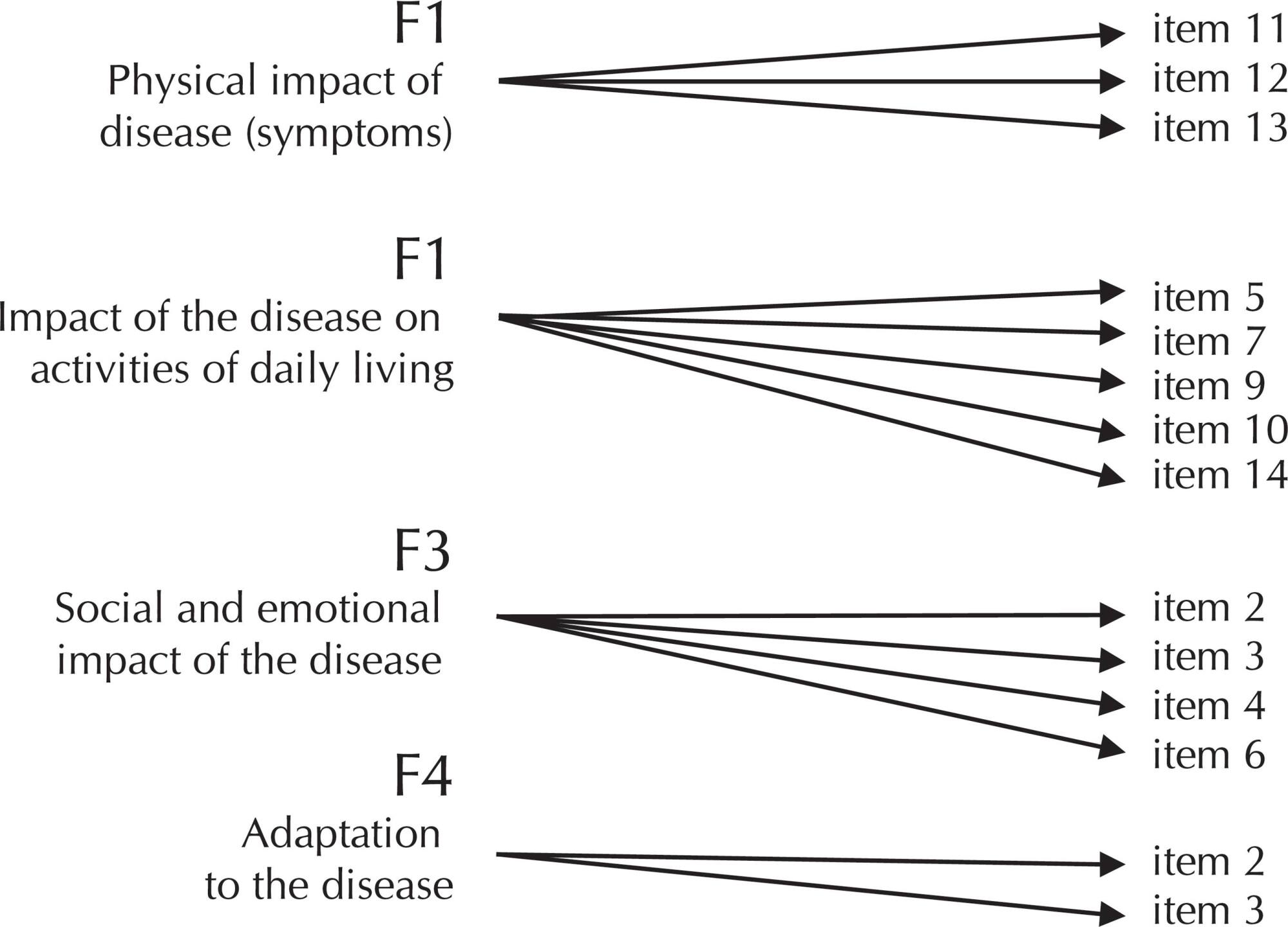
-
RESEARCH01-01-2016
Associação da fragilidade em idosos internados e institucionalizados na comunidade
Revista Brasileira de Enfermagem. 2016;69(4):691-696
Abstract
RESEARCHAssociação da fragilidade em idosos internados e institucionalizados na comunidade
Revista Brasileira de Enfermagem. 2016;69(4):691-696
DOI 10.1590/0034-7167.2016690411i
Views0See moreRESUMEN
Objetivo:
investigar la asociación entre la fragilidad y la internación e institucionalización, en un estudio de acompañamiento de residentes ancianos.
Método:
el estudio de acompañamiento fue realizado en 2008 y 2013, con ancianos de ambos sexos, de 65 años o más, los cuales vivían en la comunidad. El procedimiento de muestreo realizado fue probabilístico, con agrupamiento en dos etapas. Fueron entrevistados 512 ancianos en 2008 y 262 en 2013. Datos socioeconómicos y demográficos, morbilidad relatada por los mismos y datos específicos de internación e institucionalización han sido utilizados. La fragilidad fue medida por la escala Edmond Frail Scale (EFS) y la capacidad funcional por la escala Functional Independence Measure (FIM).
Resultados:
El promedio de la puntuación EFS fue mayor entre los residentes ancianos que fueron internados y hospitalizados, siendo estadísticamente significativa en los dos años investigados.
Conclusión:
La confirmación de la asociación entre la fragilidad y la internación e institucionalización refuerza la importancia del tema y enfatiza la fragilidad como un instrumento importante en la evaluación de los riesgos para estos eventos adversos.
-
RESEARCH01-01-2016
Association of frailty in hospitalized and institutionalized elderly in the community-dwelling
Revista Brasileira de Enfermagem. 2016;69(4):691-696
Abstract
RESEARCHAssociation of frailty in hospitalized and institutionalized elderly in the community-dwelling
Revista Brasileira de Enfermagem. 2016;69(4):691-696
DOI 10.1590/0034-7167.2016690411i
Views0See moreABSTRACT
Objective:
to investigate the association between frailty with hospitalization and institutionalization in a follow-up study of elderly residents.
Method:
the follow-up study was performed in 2008 and 2013 with elderly of both genders, aged 65 years and older who were living in the community-dwelling. The sampling procedure performed was probabilistic, with dual-stage clustering. In 2008, 515 elderly people were interviewed and, in 2013, 262. We used the socioeconomic and demographic data, self-reported morbidity, specific data of hospitalization and institutionalization. Frailty was measured by the Edmonton Frail Scale (EFS), and functional capacity through the Functional Independence Measure.
Results:
we found the mean gross EFS score was higher among resident elderly who were hospitalized and institutionalized and was statistically significant in both investigated years.
Conclusion:
the confirmation of association between frailty and hospitalization and institutionalization reinforces the importance of the subject, and highlights frailty as an important tool for risk estimates for these adverse events.
-
RESEARCH01-01-2016
Analysis of managerial and healthcare indicators after nursing personnel upsizing
Revista Brasileira de Enfermagem. 2016;69(4):684-690
Abstract
RESEARCHAnalysis of managerial and healthcare indicators after nursing personnel upsizing
Revista Brasileira de Enfermagem. 2016;69(4):684-690
DOI 10.1590/0034-7167.2016690410i
Views0ABSTRACT
Objective:
analyze healthcare and managerial indicators after nursing personnel upsizing.
Method:
a retrospective, descriptive study was conducted using data from computer systems of a university hospital in southern Brazil. Healthcare and managerial indicators related to the first half of 2013 and 2014 were statistically analyzed.
Results:
increases of 40.0% in the number of nurses and 16.0% in the number of nursing technicians led to reductions of 12.0% in the number of sickness absences, 21.8% in positive balance for compensatory time off, 92.0% in paid overtime. Reductions of 75.0% in pressure ulcer rates, 10.5% in the number of falls and 50.0% in infections due to indwelling catheter use were also observed.
Conclusion:
nursing staff upsizing caused a positive impact on managerial and healthcare indicators and helped qualify care and improve work conditions for the nursing team.
Keywords:AbsenteeismHealth Care Quality IndicatorsHospital Nursing StaffHospital Personnel AdministrationPatient SafetySee more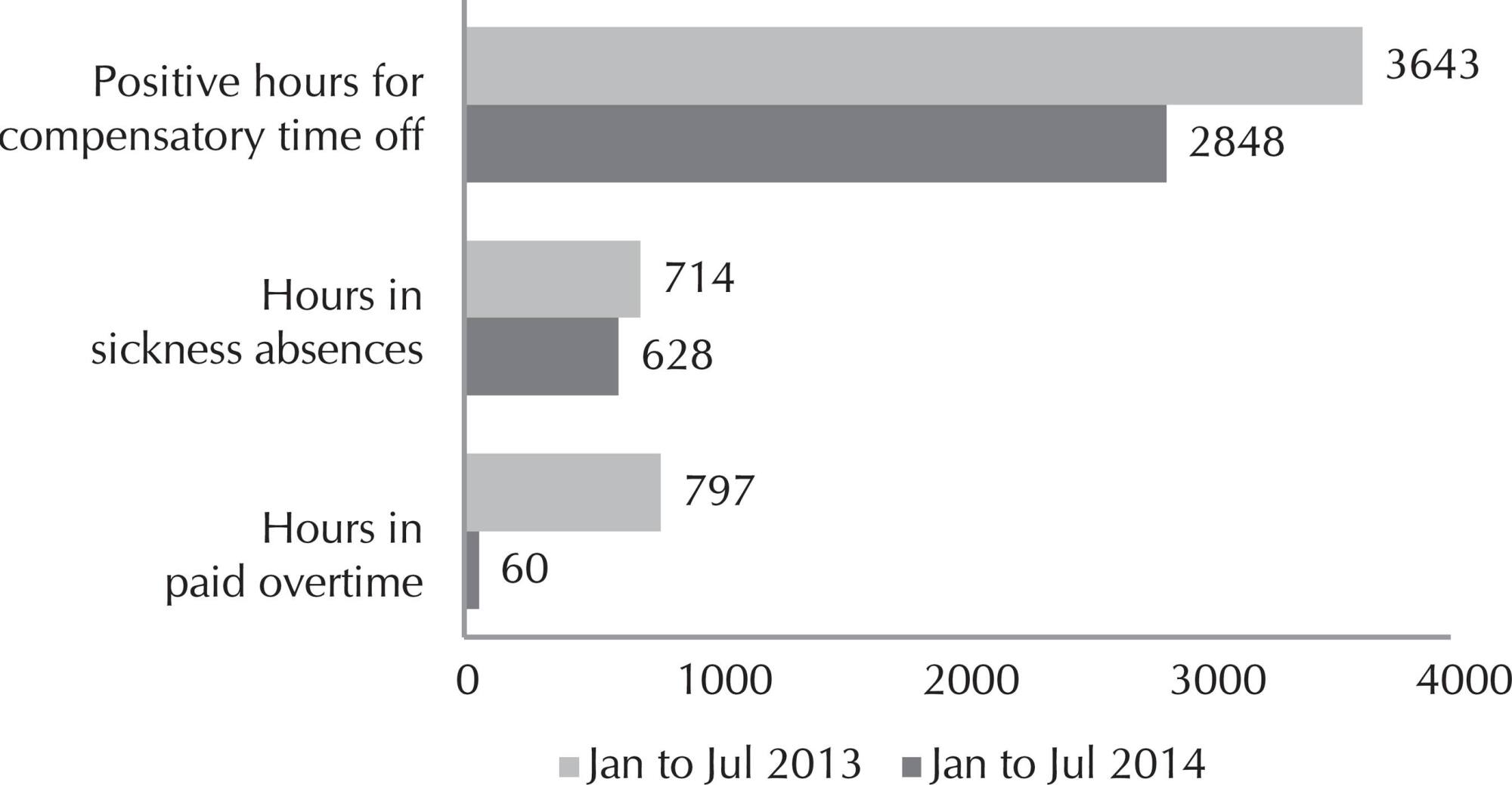
-
RESEARCH01-01-2017
Assessing the adequacy of workload measurement tools using a quality-based methodology
Revista Brasileira de Enfermagem. 2017;70(1):39-46
Abstract
RESEARCHAssessing the adequacy of workload measurement tools using a quality-based methodology
Revista Brasileira de Enfermagem. 2017;70(1):39-46
DOI 10.1590/0034-7167-2016-0246
Views0See moreABSTRACT
Objective:
determine which tool (NEMS and NAS) is most suitable for use in intensive care units using a quality-based methodology.
Method:
after identifying the opportunity for improvement “Inadequacy of the NEMS for determining nursing workload in the intensive care unit (ICU)”, we assessed the NEMS and the NAS, as a proposed improvement to the NEMS, using quality improvement cycles methodology based on the following criteria: measurement of daily nursing workload on a daily and shift basis; the tool encompasses all nursing activities undertaken in the ICU; and workload assessed per patient and unit.
Results:
there was no significant difference in level of compliance for the NEMS (67%). The comparison NEMS-NAS showed that there was a statistically significant improvement for all criteria except criterion 1. The NEMS only assesses criterion 1 (64.22%); while the NAS assessed all four criteria, obtaining a compliance rate of 64.74% for criteria 1, 2, and 4, and 100% for criterion 3.
Conclusion:
the NAS is more suitable for measuring nursing workload in UCIs.
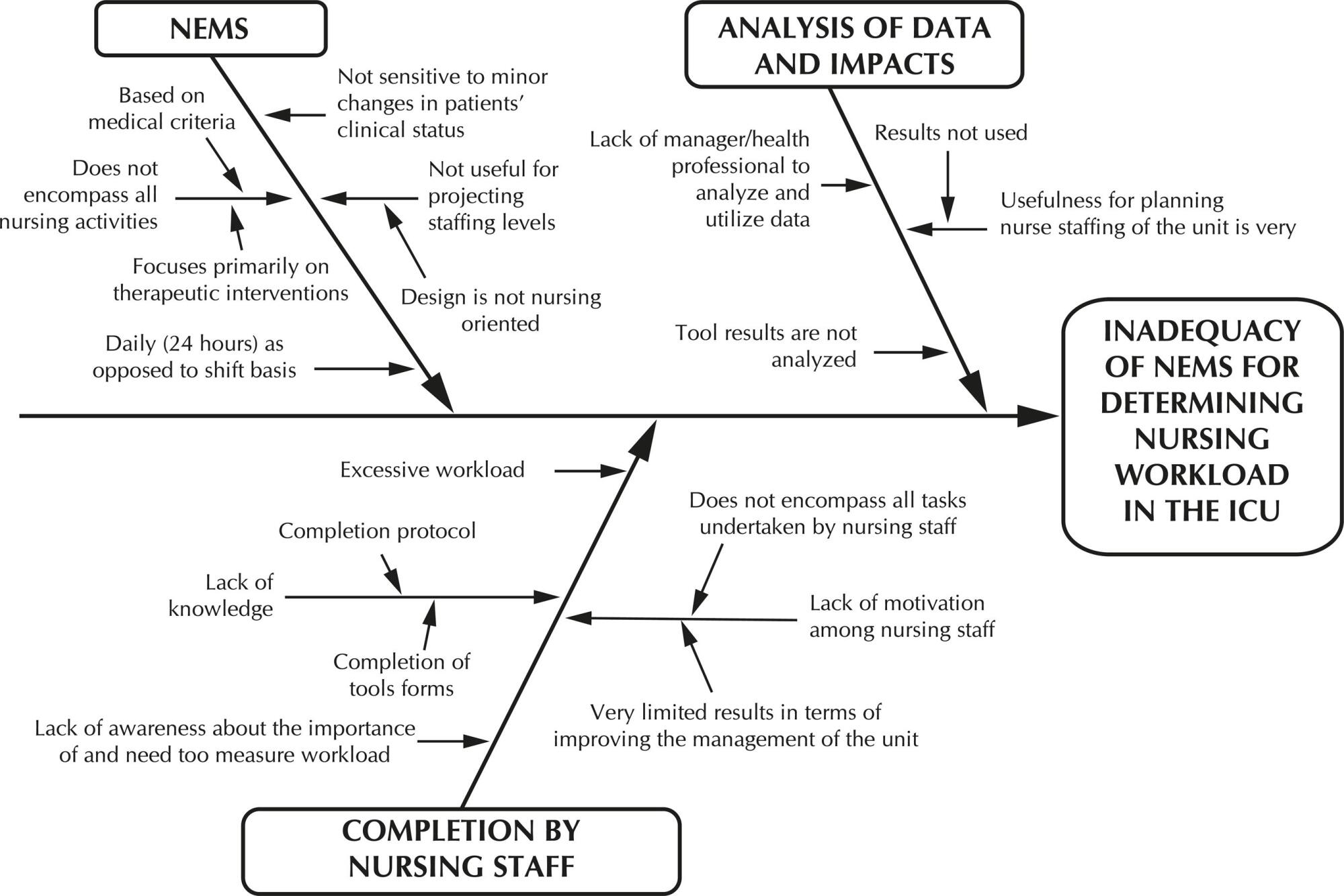
-
RESEARCH01-01-2017
Educational nursing intervention to reduce the hyperphosphatemia in patients on hemodialysis
Revista Brasileira de Enfermagem. 2017;70(1):31-38
Abstract
RESEARCHEducational nursing intervention to reduce the hyperphosphatemia in patients on hemodialysis
Revista Brasileira de Enfermagem. 2017;70(1):31-38
DOI 10.1590/0034-7167-2016-0015
Views0See moreABSTRACT
Objective:
to evaluate the effectiveness of an educational nursing intervention to reduce hyperphosphataemia in chronic renal patients on hemodialysis.
Method:
quasi-experimental study with 63 hyperphosphatemic patients on hemodialysis. The intervention consisted of developing and providing a printed and illustrated manual to patients containing information on disease control. The participant was asked to complete a daily checklist with the aim to reinforce aspects provided in the manual. Laboratory tests and itching intensity were analyzed at the beginning of the study, and at 30 and 60 days after the educational intervention.
Results:
the mean age of participants was 58±13.1 years, with a treatment time of 51.1±44.7 months. A reduction in serum phosphorus values of 7.06 ± 1.43 to 5.80 ± 1.53 (p <0.001) and the intensity of itching after the intervention was observed.
Conclusion:
the educational nursing intervention was effective in reducing phosphate and decreasing itching in hyperphosphatemic patients.
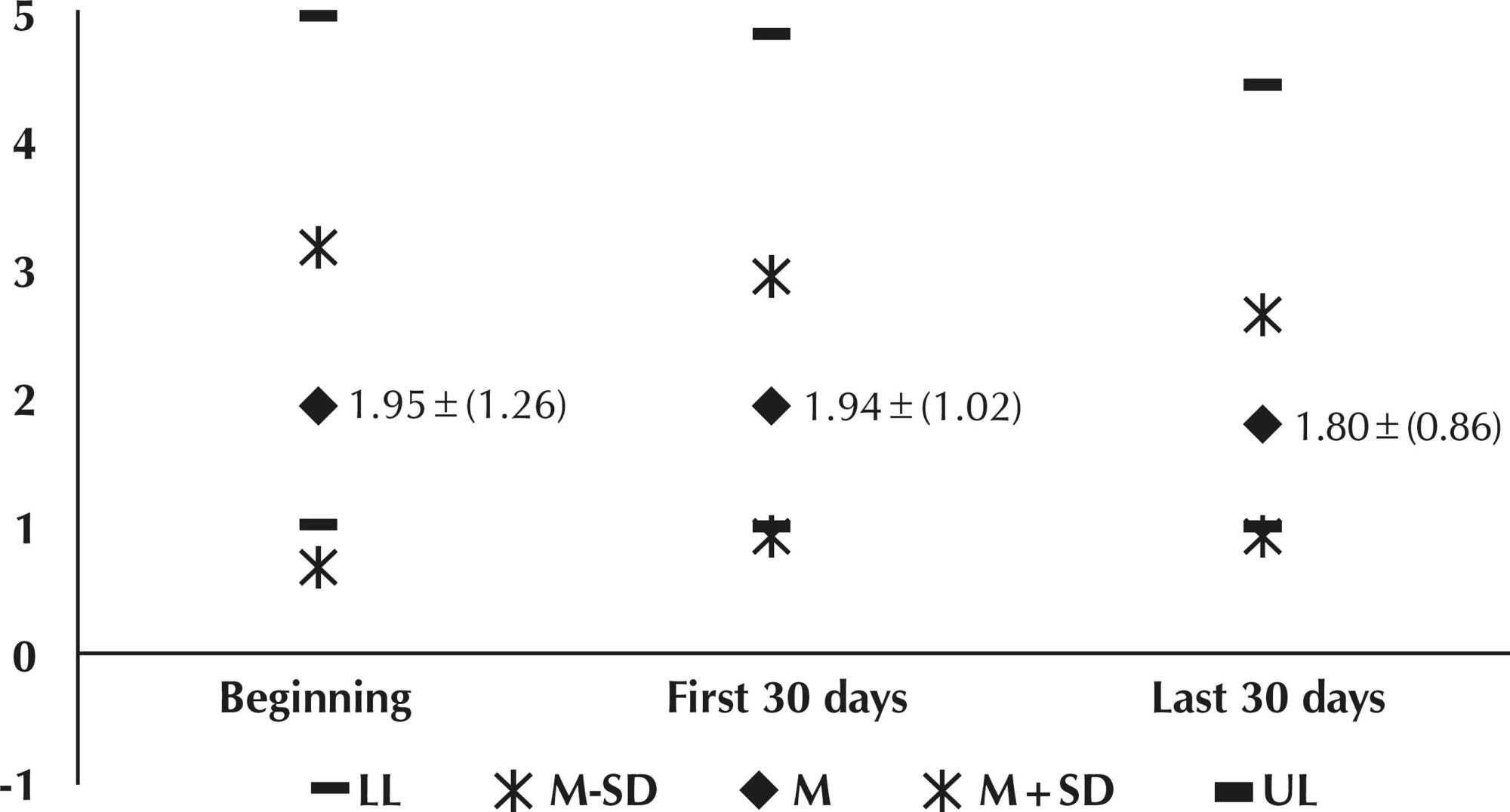
-
RESEARCH01-01-2017
Filial care and the relationship with the elderly in families of different nationalities
Revista Brasileira de Enfermagem. 2017;70(1):22-30
Abstract
RESEARCHFilial care and the relationship with the elderly in families of different nationalities
Revista Brasileira de Enfermagem. 2017;70(1):22-30
DOI 10.1590/0034-7167-2015-0050
Views0See moreABSTRACT
Objective:
identify how filial care and the relationship with the elderly occur in families of different nationalities.
Method:
qualitative study carried out in a town on the triple frontier of Paraná, comprising 33 elderly people of five different nationalities, adopting the Symbolic Interactionism and the Grounded Theory as theoretical-methodological strategy.
Results:
among Lebanese people, the Muslim religion teaches children to obey and respect parents; among French, distant family relationships and institutions for the elderly stand out. Paraguayans hold close family relationships; Chinese people consider filial care as a tacit obligation; Brazilians, in turn, tend to embrace and take care of their parents in old age.
Conclusion:
family care prevailed, but the traditions of each society lead the actions of that care, demanding health professionals’ capacity of recognizing in which context the elderly is inserted.
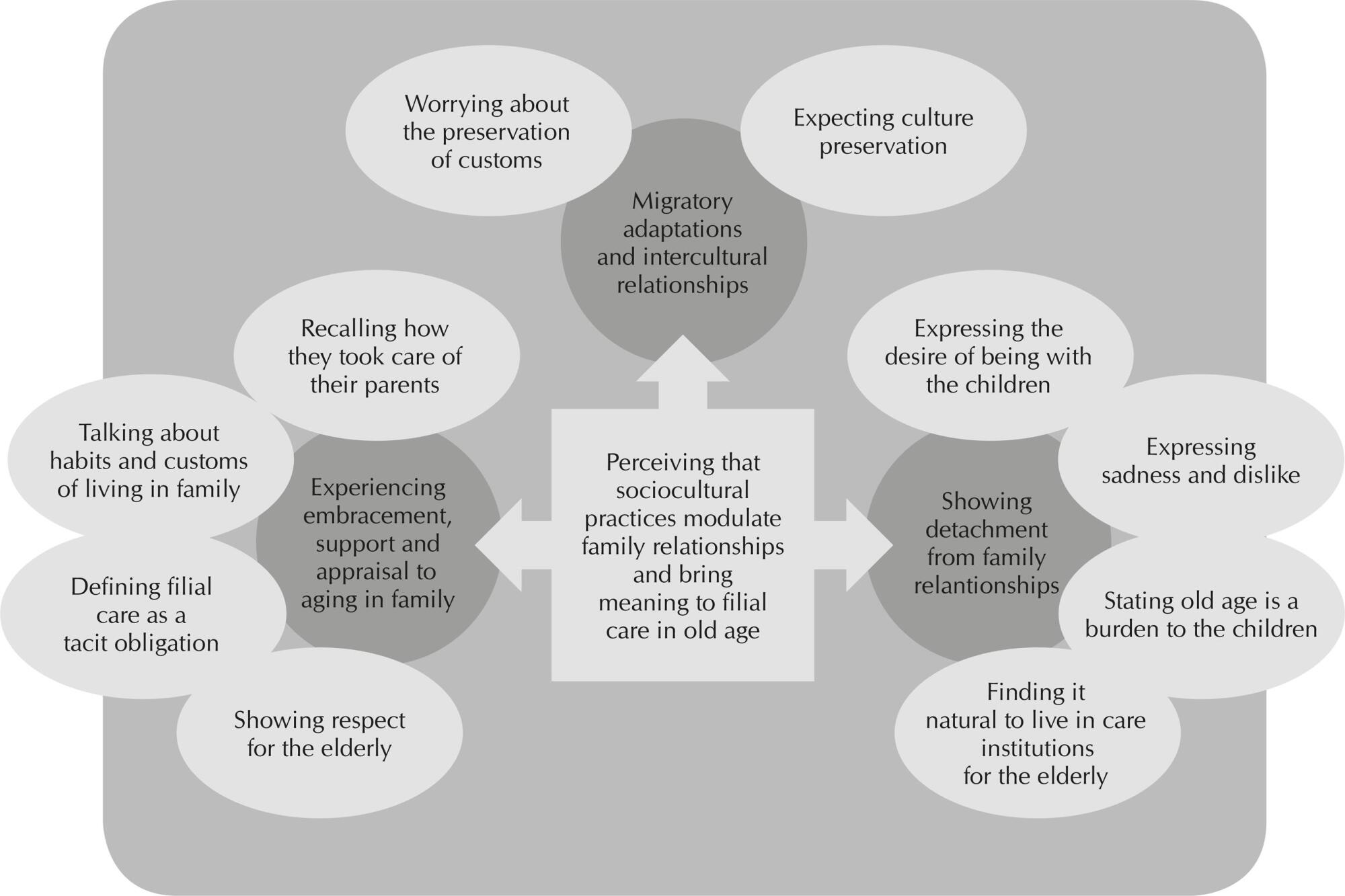
-
RESEARCH01-01-2017
Excesso de volume de líquidos: análise clínica e sociodemográfica em pacientes de hemodiálise
Revista Brasileira de Enfermagem. 2017;70(1):15-21
Abstract
RESEARCHExcesso de volume de líquidos: análise clínica e sociodemográfica em pacientes de hemodiálise
Revista Brasileira de Enfermagem. 2017;70(1):15-21
DOI 10.1590/0034-7167-2015-0138
Views0See moreRESUMEN
Objetivo:
analizar las características definitorias y los factores relacionados con el diagnóstico enfermero de exceso de volumen líquido y su relación con variables sociodemográficas y clínicas en pacientes de hemodiálisis.
Método:
estudio transversal, realizado mediante un formulario y examen físico, con una muestra de 100 pacientes, entre diciembre de 2012 y abril de 2013 en un hospital universitario y una clínica de diálisis.
Resultados:
se encontraron 10 asociaciones estadísticamente significativas entre las características definitorias, factores relacionados de volumen de exceso de líquido y las variables sociodemográficas y clínicas.
Conclusión:
las características definitorias y los factores relacionados de exceso de volumen líquido podrían estar influenciados por variables sociodemográficas y clínicas en clientes de hemodiálisis.
-
RESEARCH01-01-2017
Excess fluid volume: sociodemographic and clinical analysis in haemodialysis patients
Revista Brasileira de Enfermagem. 2017;70(1):15-21
Abstract
RESEARCHExcess fluid volume: sociodemographic and clinical analysis in haemodialysis patients
Revista Brasileira de Enfermagem. 2017;70(1):15-21
DOI 10.1590/0034-7167-2015-0138
Views0See moreABSTRACT
Objective:
To analyse the defining characteristics and related factors in the nursing diagnosis Excess fluid volume and its relationship to sociodemographic and clinical variables in haemodialysis patients.
Method:
Cross-sectional study, conducted using a form and physical examination, with a sample of 100 patients, between December 2012 and April 2013 at a university hospital and a dialysis clinic.
Results:
It was found 10 significant statistical associations between the defining characteristics/ related factors of Excess fluid volume and the sociodemographic and clinical variables.
Conclusion:
The defining characteristics and related factors of Excess fluid volume could be influenced by sociodemographic and clinical variables in haemodialysis clientele.
-
EDITORIAL01-01-2017
Facing challenges in times of adversity
Revista Brasileira de Enfermagem. 2017;70(1):1-2
Abstract
EDITORIALFacing challenges in times of adversity
Revista Brasileira de Enfermagem. 2017;70(1):1-2
DOI 10.1590/0034-7167.2017700101
Views0At the confluence of tradition, respect for history and a critical approach to the issues inherent to the development of the nursing profession, the Brazilian Nursing Association (ABEn) has been consolidating an exemplary trajectory in Brazilian society. Throughout its history, the reflections, discussions and decisions on pertinent and urgent subjects of the profession have made […]See more -
EDITORIAL01-01-2017
Enfrentando desafios em tempos de adversidades
Revista Brasileira de Enfermagem. 2017;70(1):1-2
Abstract
EDITORIALEnfrentando desafios em tempos de adversidades
Revista Brasileira de Enfermagem. 2017;70(1):1-2
DOI 10.1590/0034-7167.2017700101
Views0Na confluência da tradição, do respeito pela história e da abordagem crítica das questões inerentes ao desenvolvimento da profissão de enfermagem, a Associação Brasileira de Enfermagem (ABEn) vem consolidando uma trajetória exemplar na sociedade brasileira. Ao longo da sua história, as reflexões, discussões e decisões sobre assuntos pertinentes e prementes da profissão têm possibilitado intervenções […]See more -
REFLECTION01-01-2016
Epistemology of nursing care: a reflection on its foundations
Revista Brasileira de Enfermagem. 2016;69(6):1240-1245
Abstract
REFLECTIONEpistemology of nursing care: a reflection on its foundations
Revista Brasileira de Enfermagem. 2016;69(6):1240-1245
DOI 10.1590/0034-7167-2016-0331
Views0See moreABSTRACT
Objective:
to reflect on nursing care and its epistemology from its historical, theoretical, philosophical, spiritual dimensions and as a social practice.
Method:
discussions originated in the discipline “Epistemology of caring”, from the graduate nursing program of the School of Nursing, Federal University of Minas Gerais, and in critical analysis of nursing literature together with the professional practice of the authors.
Results:
we identified the necessity of developing a critical conscience on health care provision, research, and teaching, as well as on challenges in maintaining high standards of working interpersonal relationships, which has a profound impact on population health.
Conclusion:
we suggest the rescue of integrality, humanization, unity, and spirituality in researches and practices of individual, familiar, and community care, as an advance in incorporating epistemology of caring in nursing.
Search
Search in:
Nuvem de Tags
Aged (144) Atenção Primária à Saúde (239) COVID-19 (104) Cuidados de Enfermagem (269) Educação em Enfermagem (151) Educação em Saúde (139) Enfermagem (930) Estudos de Validação (131) Health Education (144) Idoso (208) Mental Health (149) Nursing (987) Nursing Care (306) Patient Safety (151) Primary Health Care (284) Qualidade de Vida (104) Quality of Life (106) Saúde Mental (145) Segurança do Paciente (150) Validation Studies (108)



